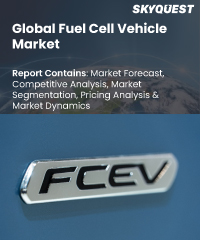
Report ID: SQMIG55F2046

Report ID:
SQMIG55F2046 |
Region:
Global |
Published Date: November, 2024
Pages:
157
|
Tables:
59 |
Figures:
75
Our industry expert will work with you to provide you with customized data in a short amount of time.
REQUEST FREE CUSTOMIZATIONFuel Cell Vehicle Market size was valued at USD 1.12 billion in 2021 and is poised to grow from USD 1.68 billion in 2022 to USD 42.29 billion by 2030, at a CAGR of 49.7% during the forecast period (2023-2030).
The competitive landscape of the global fuel cell vehicle market is characterized by intense rivalry among key players striving to establish their market presence and technological leadership. Companies are investing significantly in research and development to enhance fuel cell efficiency, increase vehicle range, and reduce costs. Partnerships and collaborations with governments, energy suppliers, and other stakeholders are common strategies to bolster infrastructure development and promote fuel cell adoption. Additionally, companies are actively exploring new markets and regions to expand their customer base and capitalize on the growing demand for sustainable transportation solutions. The market's competitiveness is further fueled by the continuous advancements in alternative electric vehicle technologies, necessitating a continuous focus on innovation and differentiation to stay ahead in the rapidly evolving industry. 'Volkswagen AG (Germany)', 'Mercedes-Benz Group (Germany)', 'Honda Motor Company Limited (Japan)', 'Hyundai Motor Company (South Korea)', 'Toyota Motor Corporation (Japan)', 'General Motors (US)', 'Ford Motor Company (US)', 'BMW Group (Germany)', 'Nissan Motor Corporation (Japan)', 'Audi AG (Germany)', 'Kia Motors Corporation (South Korea)', 'Volvo Group (Sweden)', 'Daimler AG (Germany)', 'Renault Group (France)', 'Honda Motor Co. Ltd. (Japan)', 'Tata Motors Limited (India)', 'BYD Auto Co., Ltd. (China)', 'SAIC Motor Corporation Limited (China)', 'Geely Automobile Holdings Limited (China)', 'Nikola Corporation (US)'
One key driver of the global fuel cell vehicle market is the increasing focus on sustainable and eco-friendly transportation solutions. With growing concerns about climate change and environmental degradation, there is a heightened demand for cleaner alternatives to traditional internal combustion engine vehicles. Fuel cell vehicles, powered by hydrogen and emitting only water vapor as a byproduct, present a promising solution to reduce greenhouse gas emissions and combat air pollution. This environmental consciousness among consumers, governments, and businesses is driving the adoption and development of fuel cell vehicles, propelling the market forward.
One key market trend in the above market is the increasing adoption of hydrogen fuel cell technology in public transportation. Public transport operators and bus manufacturing companies are actively exploring and integrating hydrogen fuel cell technology into their fleets to provide cleaner and more sustainable mobility solutions. This trend reflects the growing emphasis on eco-friendly transportation options and the recognition of fuel cell vehicles, particularly hydrogen buses, as a viable solution to address environmental concerns and reduce emissions in the public transport sector.
The dominant region in the global fuel cell vehicle market is Asia Pacific. The Asia Pacific region, encompassing countries like Japan, South Korea, and China, has emerged as a leader in fuel cell vehicle adoption and infrastructure development. Strong government support, ambitious renewable energy goals, and robust investments in fuel cell technology have facilitated the widespread deployment of fuel cell vehicles in both private and commercial applications. Additionally, collaborations between automakers, energy companies, and governments have further accelerated the growth of the fuel cell vehicle market in this region.
Want to customize this report? This report can be personalized according to your needs. Our analysts and industry experts will work directly with you to understand your requirements and provide you with customized data in a short amount of time. We offer $1000 worth of FREE customization at the time of purchase.

Report ID: SQMIG55F2046